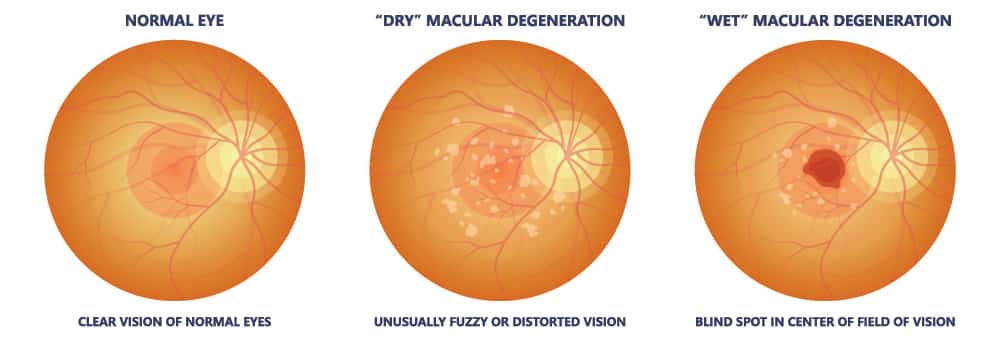Age-related Macular Degeneration (AMD) occurs when your macula is damaged. In advanced stages, people may lose their ability to drive, see faces, and read smaller print. In its early stages, AMD may have no signs or symptoms.
What is AMD?
Age-related Macular Degeneration (AMD) is common in people over 50 and is a leading cause of vision loss. Patients diagnosed with AMD often begin to lose their central vision. As a result, they cannot see fine details of objects both nearby or in the distance, but peripheral (side) vision will still be normal. AMD doesn’t usually cause blindness but can cause severe vision problems. Desert Retina Consultants offer treatments aimed at reducing the impact of this disease. Make an appointment with our retina specialists to see how we can treat your symptoms of age-related macular degeneration now!
What are the Types of AMD?
Dry AMD
Dry AMD makes up 80% of all AMD cases, making it the most common type. Dry AMD occurs when the macula gets thinner with age, allowing tiny clumps of protein to grow on the macula. There is currently no way to treat dry AMD, but specific vitamins and minerals can help slow the progression of the disease.
Wet AMD
Wet AMD is not as common as dry AMD, but it is more severe because it can lead to rapid vision loss if not treated. Wet AMD occurs when extra blood vessels grow under the retina, which can cause fluid leaks that damage the macula. Wet AMD is diagnosed during an eye exam.

Schedule a Consultation
Want to learn more about Macular Degeneration? Click the button below to request an appointment today.
Request an AppointmentHow is Macular Degeneration Managed?
The first thing to do after noticing any changes in your vision is to schedule an exam with your eye care provider. With early detection and management, there is a good chance AMD will not progress to severe vision loss.
Management for Wet AMD at Desert Retina Consultants include:
- Regular vision monitoring – some patients may need to schedule visits every 3-6 months, depending on the severity of the disease.
- Intra-vitreal injections – Anti-VEGF (vascular endothelial growth factor) drugs into the vitreous cavity can be a highly effective treatment for advanced macular degeneration. Most patients require a series of injections. The doctors at Desert Retina Consultants schedule periodic monitoring to evaluate.









